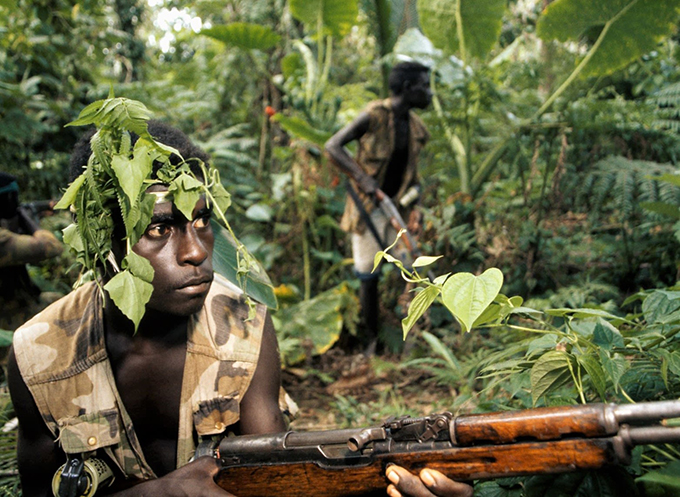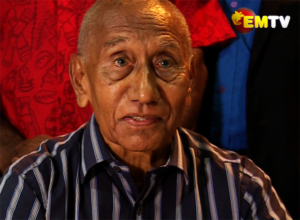
Papua New Guinea’s Deputy Opposition Leader and Shadow Inter-government and Bougainville Relations Minister Timothy Masiu says the people of Bougainville are closely watching developments over the purported “appointment” of Sir Julius Chan as caretaker PM by Peter O’Neill. The following commentary was published on journalist Sylvester Gawi’s blog Graun Blong Mi – My Land.
With all due respect to Sir Julius as a founding father of this nation, the Sandline Affair, a defining moment in the history of Papua New Guinea, which resulted in his resignation as Prime Minister has not yet been forgotten by not just the people of Bougainville, but also the many Papua New Guineans that took to the streets to protest against the involvement of foreign mercenaries in ending the Bougainville crisis.
The team leading the country at the time also included the former Deputy Prime Minister, and current Governor of Gulf Chris
Haivetta.
For those of you who may have forgotten the details, or who may have been too young to remember, or who may have a more watered down recollection, let me remind you on behalf of the people of Bougainville of the events of March 1997.
READ MORE: ‘I’m not PNG’s acting PM,’ Chan tells nation

After failed attempts to both negotiate a peace deal and also defeat the Bougainville Revolutionary Army, the Chan-Haivetta government turned to Sandline International, a company led by a retired Scots Guards Lieutenant-Colonel Tim Spicer, as both Australia and New Zealand had refused to assist.
Sandline specialised in providing arms, equipment, and contractors to participate in conflicts. At the heart of the conflict was control over CRA’s Panguna mine.
When the Sandline Affair was leaked in the Australian news media by The Australian newspaper there was a public uproar. The news quickly broke in Papua New Guinea.
PNGDF soldiers were approached by members of a local NGO called Melanesian Solidarity which wanted to consolidate a military and civil society protest against the Chan-Haivetta decision to engage Sandline.
Forced to resign
Chan was forced to resign as Prime Minister after operation “Rausim Kwick” which was planned by the then Commander of the PNG Defence Force Jerry Singirok and commanded by Major Walter Enuma, and began on the evening of the 16 March 1997.
In 24 hours they had arrested and disarmed the mercenaries.
On March 17, Singirok gave Chan, Haivetta and Defence Minister Mathias Ijape 48 hours to resign. Chan responded by refusing to resign and instead sacked Singirok.
The NGOs began nationwide strikes in support of General Singirok. Singirok accepted his termination and urged the rank and file to support his replacement. He denied that he had sought to take power in any sort of coup.
During this period the Governor-General, Sir Wiwa Korowi took out a
full page ad accusing the government of widespread corruption.
Protests continued to grow, and despite the potential for defence/
police clashes, the army observed great discipline under the watchful
eye of Major Enuma.
Chan was forced to cancel the Sandline deal and announce an inquiry –
Singirok and Enuma had achieved their most important goal. However,
they continued to demand Chan, Haivetta, and Ijapes resignations.
Sandline withdrawn
On March 21 all Sandline personnel were withdrawn from PNG. Only Tim Spicer remained to give evidence.
After immense public pressure, Chan sacked both Haivetta and Ijape and resigned himself on March 26.
The following year a peace deal was negotiated in Bougainville.
Too often here in PNG we suffer from a short memory in relation to issues of national significance such as this.
I urge those members of Parliament who continue to support the O’Neill regime camped at the Crown Hotel to think carefully and follow your conscience before any vote takes place on the floor of Parliament.
Only on the floor of Parliament can a Prime Minister be selected.
Race for copper
In a race to secure access to a commodity, copper, during the Sandline Affair the leaders of the day, Chan and Haivetta were willing to sacrifice the safety and security of the innocent men, women and children of Bougainville and the integrity of processes of government and state institutions.
This is not the type of leadership Papua New Guinea needs today as our
natural resources have grown ten-fold.
We must think of our people in Hela, Southern Highlands, Western Province, Gulf, Central, Enga, Madang, Morobe, New Ireland and now Sepik.
Our people need leadership that will protect their interests with a collective approach towards managing national assets in the national interest.”
HON TIMOTHY MASIU, MP
Deputy Opposition Leader and Member for South Bougainville
- Republished from Sylvester Gawi’s bog with permission.
- How soldier guitars, culture and faith paved the way for Bougainville’s peace














































